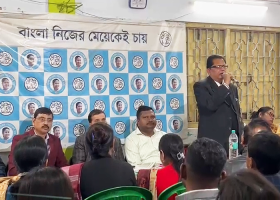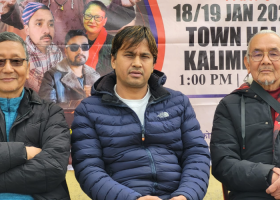The Himal World
Siliguri, Jan 22
Kaajee Singh (80) a percussionist and Padma Shri awardee from Kalimpong in West Bengal who had popularised Shree Mandal a traditional Gorkha musical instrument died at a private nursing home on Tuesday night.
He has left behind his wife and two children.
Sikkim chief minister Prem Singh Tamang Golay, Anit Thapa the chief executive of Gorkhaland Territorial Administration, Raju Bista the BJP MP from Darjeeling and many others have expressed their condolences on Singh's demise. He was suffering from kidney related issues and was admitted in the nursing home some days ago.
He was bestowed Padma Shri award in 2022.
Immediately after receiving the ward, Singh had said" I could have earned more laurels and money had I not left the Mumbai film industry 42 years ago to return home and study Gorkha and Nepali music and Shree Maadal. I never worked for awards and laurels. I returned from Mumbai thinking that Shree Maadal should be preserved and made popular among people of the coming generations."
He is credited with popularising the traditional Maruni dance and the Shree Maadal
Singh’s family who lives in Kalimpong's Seventh Mile has been contributing to music for three generations.
He invented the classical notations for Shree Maadal in 1974. He also published more than five books on the instrument and local folk music.
Though maadals are commonly used in traditional Indian music, the Shree Maadal is a typical part of Nepali and Gorkha folk music.
Born in 1945, Singh developed an interest in folk culture and music during his childhood from his father Indrajeet Singh. He started with the Maaruni dance in 1952. Later he took to Maadaley Geet, and also started taking lessons in Shree Maadal
Singh who had gone to Mumbai in 1974 also worked with Laxmikant-Pyarelal, Kalyanji-Anandji and Shankar-Jaikishan and Ram Laxman for many years.
He returned to Kalimpong in 1983.
Nishaant Singh his son who is a professor of Pakhawaj, another old percussion instrument said “My father always thought of popularising our traditional music through books. This was the primary reason for his research.











Leave a Comment